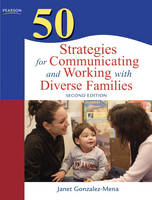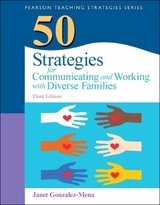
50 Strategies for Communicating and Working with Diverse Families
Pearson (Verlag)
978-0-13-700231-3 (ISBN)
- Titel erscheint in neuer Auflage
- Artikel merken
FEATURES:
Emphasizes the importance of partnerships between teachers and family members.Stresses the integral components of communication between diverse families and teachers or administrators.
Raises the important issue of respecting the various diversities and cultures that exist in today's classrooms.
Reader-friendly writing style and the alphabetic arrangement of the strategies-interesting, understandable, and easy to find what the student or teacher is looking for.
Interwoven, cross-referenced strategies-integrity throughout the book as the relationships between the strategies are highlighted; one strategy often mentions several other strategies that pertain to the same subject.
Broad coverage: spans ages 0-8 in a variety of different care and education settings-applies to early childhood educators at all levels-not exclusive to Pre-K; also includes child care, but not exclusively.
Goes beyond mere parent involvement and education-closely examines how a partnership may include both, but is different from the more common approaches early childhood educators often take to working with parents; promotes a family-centered approach instead of a child-centered one that is common practice.
Photos and artifacts illustrate the messages-these visual images are designed to help readers grasp information and enliven the book.
New to this Edition!
Strategies organized by categories, rather than alphabetically.
Emphasis on kindergarten and primary grade teachers.
Diversity theme at forefront of strategies.
New subjects covered include: working with families to maintain home language, holidays in the classroom, media issues, improving child nutrition, children playing outdoors, and dealing with death in the family.
Janet Gonzalez-Mena taught in the California university and community college systems for 35 years. She was on the full-time faculty at Napa Valley College in the Child and Family Studies Department for 15 years until her retirement. Janet started her early childhood career in a cooperative preschool as a parent volunteer back in 1966. She became a preschool teacher and taught in three types of programs including Head Start, a program for Spanish-speaking children and their families and a home-based preschool program. Later she became a director of child care programs and helped open several pilot projects including a therapeutic child care program and an infant-center. Besides preschool, Janet's special interests include working with parents, diversity, family child care, and infants. In the 1970's she studied with Magda Gerber, an infant expert from Hungary. Recently she has studied at the Pikler Institute in Budapest where Magda came from. Janet has written 4 ECE textbooks, plus a book on diversity and 2 parenting books, including a humorous one that is called "Dragon Mom." Presently Janet is involved in helping create a training project called "Strengthening Family and Professional Partnerships" with the National Association for the Education of Young Children. In 2002 she co-authored "Bridging Cultures in ECE, "a training manual, also for WestEd. She has been on the faculty of WestEd's Program for Infant-Toddler Care training of trainer institutes since 1991. Since 1998 she has been on the faculty of Beginning Together, another training of trainer institute for helping professionals learn to include children with special needs in early care and education programs. Janet lives in a multicultural family in a state where there is no longer a majority culture. In California, everyone now is a minority. Janet earned a B.A. in English from University of California, Davis (1959) and a M.A. in Human Development from Pacific Oaks College (1976).
SECTION 1 Welcoming Everybody
1 Appreciating all Kinds of Families
2 Working with Immigrant Families
3 Including Families of Children with Special Needs
4 Creating an Anti-bias Environment
5 Respecting all Families including those with Same Sex Parents
SECTION 2 Partnerships with Families
6 Building Partnerships
7 RemovingBarriers to Partnerships
8 Minimizing Competition with Parents
9 Supporting Attachment
10 Considering Authority
11 Focusing on Family Strengths
12 Helping Parents to be Advocates for their Children
13 Encouraging Parents to Become Advocates for all Children
14 Creating a Sense of Community
SECTION 3 Honoring and Working with Diversity
15 Understanding and Appreciating Cultural Differences
16 Establishing Culturally Responsive Education and Care
17 Working with conflicts around Education and Care Practices
18 Considering Cultural Differences in Guidance and Discipline
19 Working with Families around what You Believe are Harmful Practices
20 Thinking about Differing Ideas Related to How Children Learn
21 Managing Conflicts
SECTION 4 Family Participation and Education
22 Considering Family Participation
23 Including Parents in the Classroom or Center
24 Focusing on Fathers
25 Taking a Transformative Approach to Parent Education
26 Working with Parents around Holiday Issues
27 Exploring Parents’ Role on Decision-Making Boards and Councils
SECTION 5 Communication
28 Creating Environments for Communication
29 Empowering Self and Others
30 Communicating through Writing
31 Holding Ongoing Conversations with Families
32 Looking at Nonverbal Communication across Cultures
SECTION 6 Meetings and Conferences
33 Meeting Families for the First Time
34 Thinking about Meetings in General
35 Holding Conferences
36 Considering Cross Cultural Conferences
37 Talking with Families when Concerns Arise
SECTION 7 Working with Parents around Specific Issues
38 Helping the Child Enter the School or Program
39 Maintaining Home Language
40 Easing Children through Transitions
41 Bringing Nature into Children’s Lives
42 Addressing Obesity with Nutrition
43 Dealing with Media Issues
44 Maintaining Stability During Divorce
45 Coping with a Death in the Family
46 Finding Community Resources and making Referrals
SECTION 8 Challenging Conversations
47 Working with Parents who Constantly Complain
48 Working with Parents who Appear Hostile
49 Talking with Parents about Behavior Changes
50 Referring Families for Abuse or Neglect<
References
Index
| Erscheint lt. Verlag | 20.1.2010 |
|---|---|
| Sprache | englisch |
| Maße | 210 x 276 mm |
| Gewicht | 354 g |
| Themenwelt | Sozialwissenschaften ► Pädagogik ► Sozialpädagogik |
| Sozialwissenschaften ► Pädagogik ► Vorschulpädagogik | |
| Sozialwissenschaften ► Soziologie | |
| ISBN-10 | 0-13-700231-9 / 0137002319 |
| ISBN-13 | 978-0-13-700231-3 / 9780137002313 |
| Zustand | Neuware |
| Informationen gemäß Produktsicherheitsverordnung (GPSR) | |
| Haben Sie eine Frage zum Produkt? |
aus dem Bereich



